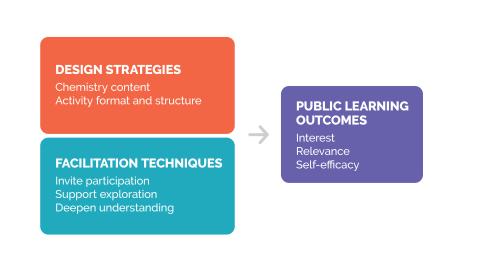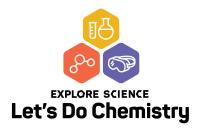ChemAttitudes, a collaborative project between the NISE Network and American Chemical Society, used a design-based research approach to develop a learning framework and a kit of hands-on informal educational activities (named "Let's Do Chemistry") that can be used with public audiences to stimulate interest, a sense of relevance, and feelings of self-efficacy (IRS) about chemistry.
The Let's Do Chemistry Train-the-Trainer Online Workshops took place October 2020 - February 2021 and taught chemistry outreach and informal science education professionals about how to build ChemAttitudes framework techniques into their outreach activities and trainings to increase positive attitudes towards chemistry.
All the materials shared in the workshops are now available for you to download and use in your own trainings. Use the resources below to learn how to apply the framework strategies to your own work!
For an overview of the Let's Do Chemistry (ChemAttitudes) framework, take a look at the Research to Practice guide.
Workshop Content and Resources

All resources used as part of the online train-the-trainer workshop are available below. To follow the order of the workshop, proceed through Modules 1-5. For each module, read through the instructions as they were given to our 2020-2021 workshop participants. The best way to learn the framework is to review each module section in full - this includes a short video, 1-2 pages of information in the participant packet, and a worksheet. Each module also includes resources to support learning about or applying the framework.
If you are interested in specific topics (i.e., information about chemistry content, activity format, or facilitation), feel free to jump to the module that makes sense for you.
Getting Started: Overview Documents
Whether you are interested in a specific module or to review the full workshop, we suggest you begin by reviewing these key documents, which provide an overview of the workshop, the ChemAttitudes project, and the research used to develop the framework.
- Participant Packet (PDF): This document provides a short overview of what the workshop involved. Inside you’ll find information about the project, directions for participating in the workshop, research highlights, and activity worksheets.
- Research Reference Guide (PDF): This guide contains the project framework and includes definitions and examples from the research, as shared in the workshop.
- Research-to-Practice Guide (PDF): Let's Do Chemistry Design Strategies and Facilitation Techniques to Encourage Positive Attitudes Toward Learning Chemistry: This guide provides a detailed description of the research behind the ChemAttitudes framework and offers examples of how to apply the framework to informal science education experiences.
Module 1: Welcome
The Welcome Module provides you with a general overview of the ChemAttitudes project and the framework we developed, which focuses on activity content, format, and facilitation methods to support participant interest, sense of relevance, and feelings of self-efficacy with respect to chemistry. Your goal for Modules 2-4 is to learn about the various framework strategies and consider how they could help make your hands-on activity stronger by supporting participants' interest, relevance, and self-efficacy around chemistry.
- Read Welcome Module Document: Includes information about the project background, workshop agenda, and workshop directions - See pages 3-7 in the Participant Packet
- Watch Module 1: Welcome video: Shares background information about the project, introduces the research, and provides an overview of the workshop (view captioned video)
- Watch An Example of the Framework in Action video: Patti Galvan, from the American Chemical Society, talks about applying the ChemAttitudes framework to hands-on activities - View video transcript
Module 2: Activity Format
Explore the framework strategies related to activity format.
- Watch Module 2: Format Strategies video: Presents research about the strategies along with examples of how to apply the framework (view captioned video)
- Read Format Module Document: See pages 8-9 in the Participant Packet
- Download the editable Format worksheet to complete digitally
Module 3: Activity Content
Explore the framework strategies related to activity content.
- Watch Module 3: Content Strategies video: Presents research about the strategies along with examples of how to apply the framework (view captioned video)
- Read Content Module Document: See pages 10-11 in the Participant Packet
- Download the editable Content worksheet to complete digitally
Module 4: Activity Facilitation
Explore the framework strategies related to activity facilitation.
- Watch Module 4: Facilitation Strategies video: Presents research about the strategies along with examples of how to apply the framework (view captioned video)
- Read Facilitation Module Document: See pages 12-15 in the Participant Packet
- Download the editable Facilitation worksheet to complete digital
- Optional Watch Facilitation Video Examples:
Module 5: Build Your Own Training
Module 5 focuses on building a future training for activity facilitators and/or other trainers. Your goal is to think through what you have learned about applying the framework (interest, relevance, and self-efficacy), and consider how you might use this knowledge to help others in their practice. Within this module, there are also some evaluation resources that may help you evaluate your own activities or trainings.
- Watch Module 5: Build Your Training video: Presents research about the strategies along with examples of how to apply the framework (view captioned video)
- Read Build Your Training Module Document - See pages 16-17 in the Participant Packet
- Download the editable Build Your Training worksheet to complete digitally
- Download the editable Build Your Training worksheet to complete digitally
To watch all the workshop training videos, visit the project's Vimeo page
Additional Workshop Resources
Let's Do Chemistry Training Resources: The list below includes a variety of resources to prepare staff and volunteers to facilitate chemistry activities. Although designed for the Explore Science: Let's Do Chemistry kit, these resources can be adapted for any chemistry outreach event.
- Explore Science: Let's Do Chemistry Professional Development and Training Materials; Framework and Strategies Guide, specifically:
- Tips for Facilitating Hands-on Chemistry Activities
- Let's Do Chemistry Event Training and Overview presentation
- Safety Guide (PDF)
- "What's in the Box" Improv Game (PDF)
- "Chem-Attitudes with Dr. Braxton Hazleby" facilitation training video
Evaluation Tools: Surveys designed to evaluate activities with public audiences and training conducted for professional audiences
- Public Activity Survey (PDF)
- Professional Training Survey (PDF)
ACS Outreach Materials: Hands-on activity and training resources from ACS to support chemistry outreach efforts
About the Project
- Learn more about the ChemAttitudes project: http://www.nisenet.org/chemattitudes
- 2020-2021 Let's Do Chemistry Train-the-Trainer Workshop Resources (Product page allows you to download as .zip files): https://www.nisenet.org/catalog/lets-do-chemistry-train-trainer-workshop-resources
- 2018 Explore Science: Let's Do Chemistry digital kit, including hands-on activities, training videos, and safety and professional development materials are available for digital download: http://www.nisenet.org/chemistry-kit
Acknowledgements
This material is based upon work supported by the National Science Foundation under Grant Number DRL 1612482. Any opinions, findings, and conclusions or recommendations expressed in this material are those of the author(s) and do not necessarily reflect the view of the National Science Foundation.

